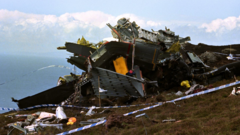Did a Chinook Crash During a Show Flight? Insights from an Ex-RAF Test Pilot

The Chinook Helicopter Crash: A Tragic Legacy and Calls for Justice
On June 2, 1994, one of the deadliest peacetime tragedies in British military history unfolded when a Chinook helicopter, RAF ZD576, crashed into a hillside over the Mull of Kintyre, Scotland. This catastrophic event took the lives of 29 individuals, including four crew members and 25 passengers, many of whom were senior personnel from the security services. The circumstances surrounding this tragedy have resurfaced, prompting renewed calls for a public inquiry, particularly after revelations regarding the flight's purpose and the aircraft's safety concerns. As we delve into the details of the crash, we explore the implications, the ongoing quest for truth, and the emotional aftermath for the families affected.
The Context of the Flight
Retired Squadron Leader Robert Burke, a former RAF test pilot, recently brought to light significant concerns regarding the flight operations leading up to the crash. According to Burke, the Chinook was being flown as a "show flight," intended to showcase the Mark 2 version of the aircraft to the Army. Despite known safety issues raised by test engineers and pilots, the decision was made to proceed with the flight, which ultimately ended in tragedy. This choice raises critical questions about the decision-making processes within the military hierarchy and the potential implications of internal politics.
Understanding the Aircraft and Safety Concerns
The Chinook ZD576 was a Mark 2 variant, recently upgraded from the earlier Mark 1 version. This upgrade was intended to enhance operational capabilities, but the safety concerns surrounding the Mark 2 have been a point of contention since its introduction. Several test pilots, including Burke, had voiced apprehensions regarding the aircraft's airworthiness. Burke noted that the flight was viewed as an opportunity to demonstrate the Mark 2's reliability amid ongoing debates about its safety. This perceived need to prove the aircraft's capabilities overshadows the well-being of those on board.
Implications of Internal Politics
Burke's allegations suggest that the decision to fly the Mark 2 Chinook was influenced by internal politics between the Army and the RAF. The need to showcase the Chinook program's progress may have overshadowed critical safety assessments. This raises important ethical questions: Why were the concerns of experienced pilots disregarded? Were the lives of the passengers deemed expendable for the sake of political or operational gain? These questions are at the forefront of the ongoing demand for a transparent investigation into the crash.
The Impact on Families and Survivors
The emotional toll of the Chinook crash extends far beyond the immediate loss of life. Families like that of Det Ch Supt Desmond Conroy, who perished in the accident, have been left grappling with grief, trauma, and a relentless search for answers. Patricia Conroy, Desmond's daughter, voiced her anguish upon learning that the flight was a show flight, stating that the decision to proceed with the flight was a reckless act that ultimately cost her father his life. Such personal testimonies highlight the profound impact of military decisions on the lives of those left behind.
The Call for a Public Inquiry
Several families of the victims have united in their demand for a public inquiry into the crash. Despite the Ministry of Defence's assertion that the circumstances of the accident have already been thoroughly investigated, many relatives believe that not enough has been done to uncover the truth. The Prime Minister's recent correspondence, in which he stated that an inquiry would not be in the public interest, has only fueled their frustration. Families argue that transparency is essential for accountability and closure.
Previous Investigations and Findings
The crash of the Chinook has been the subject of multiple investigations, including an independent judge-led review. However, families remain skeptical about the thoroughness of these inquiries, particularly given the striking revelations about safety concerns and the motivations behind the flight. The Ministry of Defence has maintained that a new public inquiry is unnecessary, asserting that existing evidence would not yield new conclusions. This statement, however, has not quelled the anger and disappointment of those who lost loved ones.
The Legacy of the Crash
The legacy of the Chinook crash is marked not only by the tragic loss of life but also by the ongoing struggles of families seeking justice and transparency. The emotional scars left by the incident are profound, as families grapple with the realities of their loss while questioning the decisions that led to the crash. The crash serves as a sobering reminder of the complexities of military operations, the importance of prioritizing safety, and the need for accountability in the face of tragedy.
Conclusion: A Call for Reflection and Action
As the 30th anniversary of the Chinook crash approaches, the need for reflection and action becomes increasingly pressing. The voices of the families of the victims must be heard, and their calls for justice should not be dismissed. It is essential to reassess the decisions made in the name of operational success and to prioritize the safety and well-being of those who put their lives at risk for the greater good. The tragedy of the Chinook crash serves as a poignant reminder of the consequences of neglecting safety concerns in the pursuit of military objectives.
FAQs
What caused the Chinook helicopter crash in Scotland?
The crash was attributed to a combination of factors, including concerns over the aircraft's airworthiness and the decision to conduct a flight that some have labeled a "show flight," intended to demonstrate the safety of the Mark 2 Chinook to the Army.
How many people died in the Chinook crash?
In total, 29 individuals lost their lives in the Chinook crash, including four crew members and 25 passengers, many of whom were senior security personnel.
What are families calling for regarding the Chinook crash?
Families of the victims are calling for a public inquiry into the crash, arguing that previous investigations have not adequately addressed their concerns regarding safety and decision-making processes.
Why did the Prime Minister refuse to initiate a public inquiry?
The Prime Minister stated that a new public inquiry would not be in the public interest, suggesting that existing evidence would not yield new conclusions, which has frustrated families seeking justice.
As we reflect on this tragic event, it's crucial to consider how the lessons learned from the Chinook crash can inform future military operations and safety protocols. Are we doing enough to ensure that the safety of personnel is prioritized over political considerations? #ChinookCrash #MilitarySafety #JusticeForVictims
Published: 2025-08-15 10:14:10 | Category: technology



